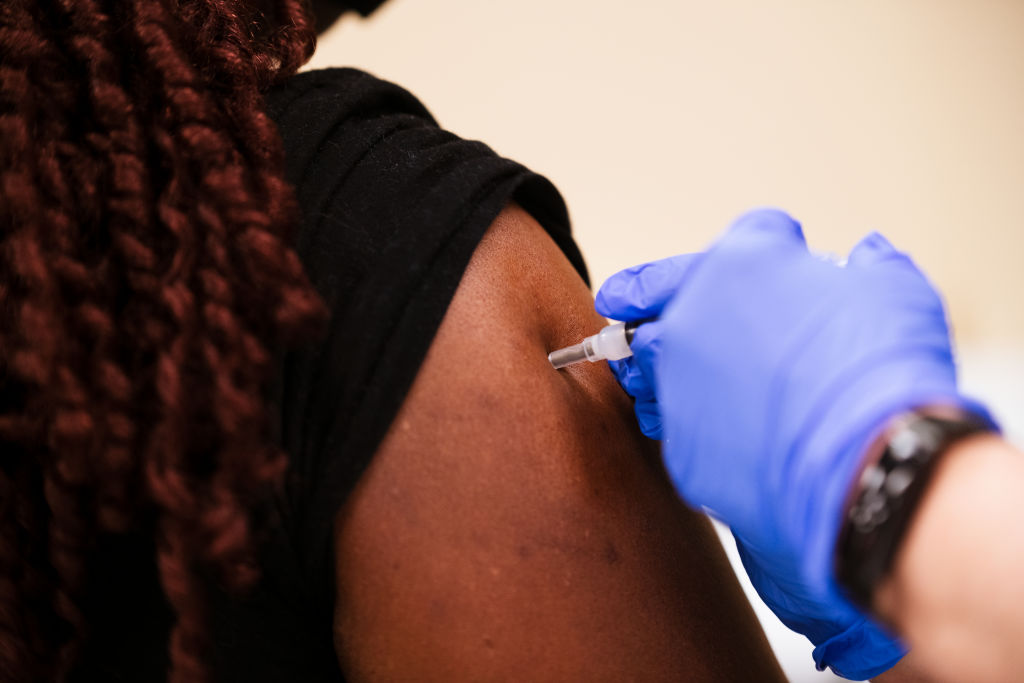Less than 25 percent of Black Americans have reportedly received their first COVID-19 shot


A free daily email with the biggest news stories of the day – and the best features from TheWeek.com
You are now subscribed
Your newsletter sign-up was successful
As of Monday, less than 25 percent of Black Americans have received their first COVID-19 shot. Health experts tell Politico that "ingrained" government skepticism, lack of transportation, inability to take time off, and deficient community outreach could explain the lag. Meanwhile, vaccination rates among other minority groups, like Hispanic Americans and Asian Americans, continue to rise following government outreach.
According to the Biden administration and public health experts, it's not that minority populations are "openly hostile" to vaccines, it's that they need "reassurance and prodding," Politico writes. Octavio Martinez, a member of the White House's COVID-19 Health Equity Task Force, said the government's equity-focused efforts will require "relationship building and it's going to take a little longer." He added, "We have a systemic issue here."
In Washington, D.C., Black Americans constitute nearly 8 in 10 new cases and close to 90 percent of deaths since May 1. White House efforts that have succeeded elsewhere have yet to gain "similar traction" in Black communities, per Politico.
The Week
Escape your echo chamber. Get the facts behind the news, plus analysis from multiple perspectives.

Sign up for The Week's Free Newsletters
From our morning news briefing to a weekly Good News Newsletter, get the best of The Week delivered directly to your inbox.
From our morning news briefing to a weekly Good News Newsletter, get the best of The Week delivered directly to your inbox.
"It's going to take a lot of effort from a lot of different places," said Reed Tuckson, founder of the Black Coalition Against COVID-19. Tuckson has partnered with the White House on a program to get Black-owned barber shops and beauty salons to promote vaccines and host vaccination sites.
Advocates are hopeful efforts like the barbershop initiative can close the racial vaccination gap and push the nation closer to having administered at least one shot to 70 percent of adults, President Biden's July 4 goal.
Osaremen Okolo, a policy adviser on the White House COVID-19 response team, said all of the administration's equity initiatives are "intended to uplift the Black community," writes Politico. She added, "We are not leaving anyone behind." Read more at Politico.
A free daily email with the biggest news stories of the day – and the best features from TheWeek.com
Brigid Kennedy worked at The Week from 2021 to 2023 as a staff writer, junior editor and then story editor, with an interest in U.S. politics, the economy and the music industry.
-
 Sepsis ‘breakthrough’: the world’s first targeted treatment?
Sepsis ‘breakthrough’: the world’s first targeted treatment?The Explainer New drug could reverse effects of sepsis, rather than trying to treat infection with antibiotics
-
 James Van Der Beek obituary: fresh-faced Dawson’s Creek star
James Van Der Beek obituary: fresh-faced Dawson’s Creek starIn The Spotlight Van Der Beek fronted one of the most successful teen dramas of the 90s – but his Dawson fame proved a double-edged sword
-
 Is Andrew’s arrest the end for the monarchy?
Is Andrew’s arrest the end for the monarchy?Today's Big Question The King has distanced the Royal Family from his disgraced brother but a ‘fit of revolutionary disgust’ could still wipe them out
-
 A Nipah virus outbreak in India has brought back Covid-era surveillance
A Nipah virus outbreak in India has brought back Covid-era surveillanceUnder the radar The disease can spread through animals and humans
-
 Trump HHS slashes advised child vaccinations
Trump HHS slashes advised child vaccinationsSpeed Read In a widely condemned move, the CDC will now recommend that children get vaccinated against 11 communicable diseases, not 17
-
 Covid-19 mRNA vaccines could help fight cancer
Covid-19 mRNA vaccines could help fight cancerUnder the radar They boost the immune system
-
 FDA OKs generic abortion pill, riling the right
FDA OKs generic abortion pill, riling the rightSpeed Read The drug in question is a generic version of mifepristone, used to carry out two-thirds of US abortions
-
 The new Stratus Covid strain – and why it’s on the rise
The new Stratus Covid strain – and why it’s on the riseThe Explainer ‘No evidence’ new variant is more dangerous or that vaccines won’t work against it, say UK health experts
-
 RFK Jr. vaccine panel advises restricting MMRV shot
RFK Jr. vaccine panel advises restricting MMRV shotSpeed Read The committee voted to restrict access to a childhood vaccine against chickenpox
-
 Texas declares end to measles outbreak
Texas declares end to measles outbreakSpeed Read The vaccine-preventable disease is still spreading in neighboring states, Mexico and Canada
-
 RFK Jr. shuts down mRNA vaccine funding at agency
RFK Jr. shuts down mRNA vaccine funding at agencySpeed Read The decision canceled or modified 22 projects, primarily for work on vaccines and therapeutics for respiratory viruses
